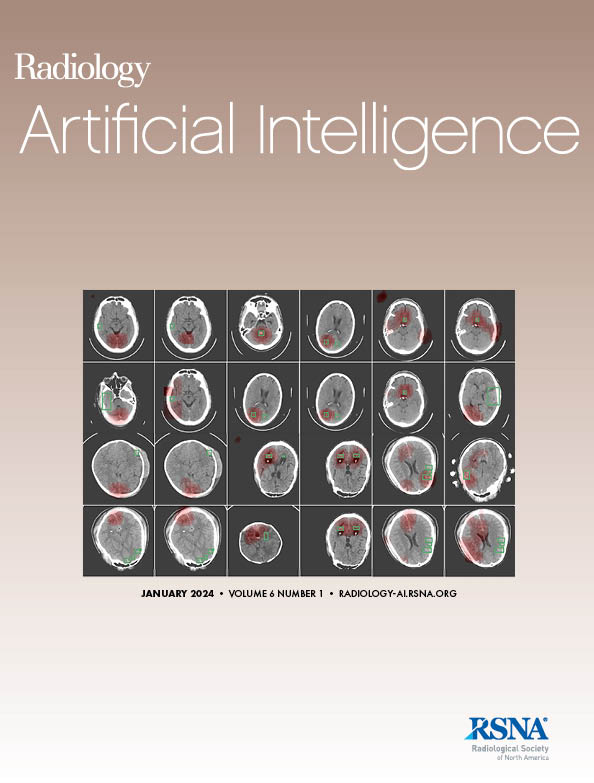Deep Anatomical Federated Network (Dafne): An Open Client-Server Framework for Continuous, Collaborative Improvement of Deep Learning-based Medical Image Segmentation.
IF 13.2
Q1 COMPUTER SCIENCE, ARTIFICIAL INTELLIGENCE
Francesco Santini, Jakob Wasserthal, Abramo Agosti, Xeni Deligianni, Kevin R Keene, Hermien E Kan, Stefan Sommer, Fengdan Wang, Claudia Weidensteiner, Giulia Manco, Matteo Paoletti, Valentina Mazzoli, Arjun Desai, Anna Pichiecchio
求助PDF
{"title":"Deep Anatomical Federated Network (Dafne): An Open Client-Server Framework for Continuous, Collaborative Improvement of Deep Learning-based Medical Image Segmentation.","authors":"Francesco Santini, Jakob Wasserthal, Abramo Agosti, Xeni Deligianni, Kevin R Keene, Hermien E Kan, Stefan Sommer, Fengdan Wang, Claudia Weidensteiner, Giulia Manco, Matteo Paoletti, Valentina Mazzoli, Arjun Desai, Anna Pichiecchio","doi":"10.1148/ryai.240097","DOIUrl":null,"url":null,"abstract":"<p><p>Purpose To present and evaluate Dafne (deep anatomical federated network), a freely available decentralized, collaborative deep learning system for the semantic segmentation of radiologic images through federated incremental learning. Materials and Methods Dafne is free software with a client-server architecture. The client side is an advanced user interface that applies the deep learning models stored on the server to the user's data and allows the user to check and refine the prediction. Incremental learning is then performed on the client's side and sent back to the server, where it is integrated into the root model. Dafne was evaluated locally by assessing the performance gain across model generations on 38 MRI datasets of the lower legs and through the analysis of real-world usage statistics (639 use cases). Results Dafne demonstrated a statistical improvement in the accuracy of semantic segmentation over time (average increase of the Dice similarity coefficient by 0.007 points per generation on the local validation set, <i>P</i> < .001). Qualitatively, the models showed enhanced performance on various radiologic image types, including those not present in the initial training sets, indicating good model generalizability. Conclusion Dafne showed improvement in segmentation quality over time, demonstrating potential for learning and generalization. <b>Keywords:</b> Segmentation, Muscular, Open Client-Server Framework <i>Supplemental material is available for this article.</i> © RSNA, 2025.</p>","PeriodicalId":29787,"journal":{"name":"Radiology-Artificial Intelligence","volume":" ","pages":"e240097"},"PeriodicalIF":13.2000,"publicationDate":"2025-05-01","publicationTypes":"Journal Article","fieldsOfStudy":null,"isOpenAccess":false,"openAccessPdf":"","citationCount":"0","resultStr":null,"platform":"Semanticscholar","paperid":null,"PeriodicalName":"Radiology-Artificial Intelligence","FirstCategoryId":"1085","ListUrlMain":"https://doi.org/10.1148/ryai.240097","RegionNum":0,"RegionCategory":null,"ArticlePicture":[],"TitleCN":null,"AbstractTextCN":null,"PMCID":null,"EPubDate":"","PubModel":"","JCR":"Q1","JCRName":"COMPUTER SCIENCE, ARTIFICIAL INTELLIGENCE","Score":null,"Total":0}
引用次数: 0
引用
批量引用
Abstract
Purpose To present and evaluate Dafne (deep anatomical federated network), a freely available decentralized, collaborative deep learning system for the semantic segmentation of radiologic images through federated incremental learning. Materials and Methods Dafne is free software with a client-server architecture. The client side is an advanced user interface that applies the deep learning models stored on the server to the user's data and allows the user to check and refine the prediction. Incremental learning is then performed on the client's side and sent back to the server, where it is integrated into the root model. Dafne was evaluated locally by assessing the performance gain across model generations on 38 MRI datasets of the lower legs and through the analysis of real-world usage statistics (639 use cases). Results Dafne demonstrated a statistical improvement in the accuracy of semantic segmentation over time (average increase of the Dice similarity coefficient by 0.007 points per generation on the local validation set, P < .001). Qualitatively, the models showed enhanced performance on various radiologic image types, including those not present in the initial training sets, indicating good model generalizability. Conclusion Dafne showed improvement in segmentation quality over time, demonstrating potential for learning and generalization. Keywords: Segmentation, Muscular, Open Client-Server Framework Supplemental material is available for this article. © RSNA, 2025.
深度解剖联合网络(Dafne):一个开放的客户端-服务器框架,用于持续协作改进基于深度学习的医学图像分割。
“刚刚接受”的论文经过了全面的同行评审,并已被接受发表在《放射学:人工智能》杂志上。这篇文章将经过编辑,布局和校样审查,然后在其最终版本出版。请注意,在最终编辑文章的制作过程中,可能会发现可能影响内容的错误。目的介绍和评估Dafne (deep anatomic federated network),这是一个免费的分散、协作的深度学习系统,用于通过联邦增量学习对放射图像进行语义分割。材料和方法Dafne是一款免费软件,采用客户机-服务器架构。客户端是一个高级用户界面,它将存储在服务器上的深度学习模型应用于用户的数据,并允许用户检查和改进预测。然后在客户端执行增量学习,并将其发送回服务器,在那里将其集成到根模型中。通过在38个下肢MRI数据集上评估不同模型代的性能增益,并通过分析现实世界的使用统计数据(n = 639个用例),对Dafne进行了局部评估。结果Dafne证明了随着时间的推移语义分割的准确性有统计学上的提高(骰子相似系数在局部验证集中平均增加0.007点/代,P < .001)。定性地说,模型在各种放射图像类型上表现出增强的性能,包括那些不存在于初始训练集中的图像,表明了良好的模型泛化性。结论随着时间的推移,Dafne的分割质量有所提高,显示出学习和泛化的潜力。©RSNA, 2025年。
本文章由计算机程序翻译,如有差异,请以英文原文为准。
来源期刊
期刊介绍:
Radiology: Artificial Intelligence is a bi-monthly publication that focuses on the emerging applications of machine learning and artificial intelligence in the field of imaging across various disciplines. This journal is available online and accepts multiple manuscript types, including Original Research, Technical Developments, Data Resources, Review articles, Editorials, Letters to the Editor and Replies, Special Reports, and AI in Brief.

 求助内容:
求助内容: 应助结果提醒方式:
应助结果提醒方式:


